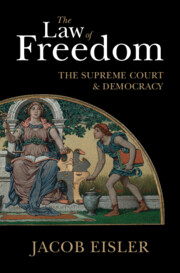Book contents
- The Law of Freedom
- The Law of Freedom
- Copyright page
- Dedication
- Epigraph
- Contents
- Preface
- Acknowledgments
- Introduction
- 1 The Counterpopular Dilemma
- 2 Constitutionalism and the Counterpopular Dilemma
- 3 Traversing the Dilemma
- 4 One Person, One Vote
- 5 Campaign Finance
- 6 Parties in Democracy
- 7 Race and Elections
- Conclusion
- Selected Bibliography
- Index
5 - Campaign Finance
Contesting Voters’ Cognitive Capacities
Published online by Cambridge University Press: 06 July 2023
- The Law of Freedom
- The Law of Freedom
- Copyright page
- Dedication
- Epigraph
- Contents
- Preface
- Acknowledgments
- Introduction
- 1 The Counterpopular Dilemma
- 2 Constitutionalism and the Counterpopular Dilemma
- 3 Traversing the Dilemma
- 4 One Person, One Vote
- 5 Campaign Finance
- 6 Parties in Democracy
- 7 Race and Elections
- Conclusion
- Selected Bibliography
- Index
Summary
Since Buckley v. Valeo, campaign finance jurisprudence has been riven by the constitutional limits on the regulation of funded campaign speech. The Court’s enduring but unpopular compromise that contributions can be limited to prevent corruption but that the right to free speech prevents the restriction of expenditures has been assailed as both too restrictive and insufficiently robust. The debate is typically cast as a straightforward question of which source of power is the greater threat: plutocratic wealth that can corrupt leaders, or a state that can oppress its citizens. However, this intractable conflict can be unified by considering democratic governance as a matter of constituent self-rule. Neither private nor state influence over campaign media overdetermines the results of elections; both operate to influence voters. The critical question is what poses the greater threat to voter cognition and preference development. This observation, framed by a Kantian understanding of free will, captures the true core of the judicial debates – contestation over what circumstances pose the greatest threat to the autonomy of voter preference formation.
Keywords
- Type
- Chapter
- Information
- The Law of FreedomThe Supreme Court and Democracy, pp. 158 - 199Publisher: Cambridge University PressPrint publication year: 2023



